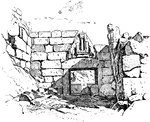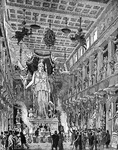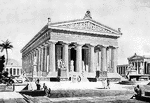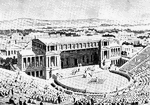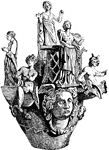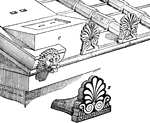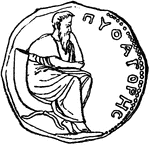
Homer
"Homer. Of all the writings that describe this Heroic Age, the most important are the two great narrative…

Miltiades
"The chief credit of the battle of Marathon belongs to Miltiades. But for his courage, the Athenians…

Pericles
"The Age of Pericles. The interval of about fifty years between the close of the Persian and the beginning…

Accubation
"The act of lying or reclining; specifically, the ancient practice, derived from the Orient, of eating…

Acontium
"a dart or javelin, smaller and lighter than the long spear, and thrown by means of a thong, or amentum"-Whitney,…

Acropolis
"The citadel of a Grecian city, usually the site of the original settlement, and situated on an eminence…
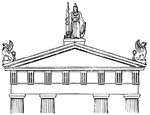
Acroteria
"Small pedestals placed on the apex or angle of a pediment for the support of a statue or other ornament."-Whitney,…
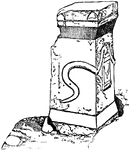
Greek Altar
"Round, triangular, or square in plan, often elaborately adorned with sculpture, and bearing inscriptions."-Whitney,…

Amphora
"A jar with two handles; Among the Greek and Roman, a vessel, usually tall and slender having two handles…
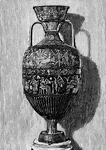
Amphora
"A jar with two handles; Among the Greek and Roman, a vessel, usually tall and slender having two handles…
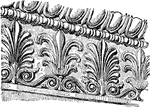
Anthemion-Molding
"A molding or frieze ornamented with a series of anthemia, usually in graceful alternation of two forms."-Whitney,…

Amphora
Amphoræ are jars with narrow necks and two handles, used by ancient Greeks for transporting oil…

Amphora
Amphoræ are jars with narrow necks and two handles, used by ancient Greeks for transporting oil…

Amphora
Amphoræ are jars with narrow necks and two handles, used by ancient Greeks for transporting oil…

Aphrodite
"The Greek goddess of love and beauty, identified by the Romans with their Venus, who was originally…

Archaistic Statuette
"Archaistic Bronze Statuette from Verona, in the British Museum, in the imitation of Greek work, of…

Grecian Doric Capital
"The Doric Order is, in architecture, the second of the five orders, being that between the Tuscan and…
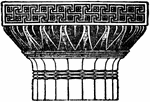
Grecian Doric Capital
"The Doric Order is, in architecture, the second of the five orders, being that between the Tuscan and…

Grecian Doric Capital
"The Doric Order is, in architecture, the second of the five orders, being that between the Tuscan and…

Auletris
"Auletris.- Performer on the double flute or diaulos. (From a Greek red-figured vase; 5th century B.C.)"-Whitney,…
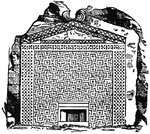
Tomb of Midas
"Midas was, in Greek legend, a King of Phrygia. For his kindness to Silenus he was promised by Dionysus…
Tragedy masks
"Tragedy masks. The origin of Greek drama is to be found in the yearly celebrations in honor of Dionysus,…
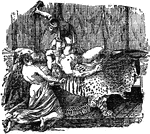
Man with ax
"Who brandishing aloft the ax of doom, That just has laid one victim at her feet, Looks round her for…
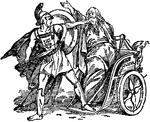
Death of Laius
"When grown up, Oedipus is told by the oracle that he would slay his father and marry his mother. On…

Thesus and the Minotaur
"Thesus and the Minotaur. (From a vase-painting in the Vatican Museum.) — The Delphian Society,…
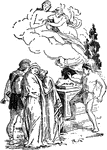
Rescue of Iphigenia
"When she was about to be slain at the altar, Artemis intervened and carried her off in a cloud to be…
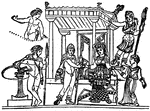
Iphegnia delivers letter to Pylades
"What in this letter is contained, what here, Is written, all I will repeat to thee, That thou mayst…
Comedy masks
"While Greek tragedt grew farther and farther away from the humor and burlesque so characteristic of…

Greek philosophers
"Greek Philosophy, which reached its highest excellence in Athens in the fourth century before Christ,…
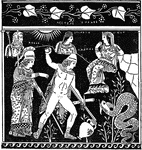
Cadmus and the Dragon
"Cadmus and the Dragon. (From a vase-painting at Naples.)" — The Delphian Society, 1913

Pericles
"So long as Pericles stood at the head of Athens in time of peace, he governed it with moderation and…

Isocrates
"Isocrates was the son of a prosperous flute-maker; he was born at Athens B.C. 436, and lived till 338.…
